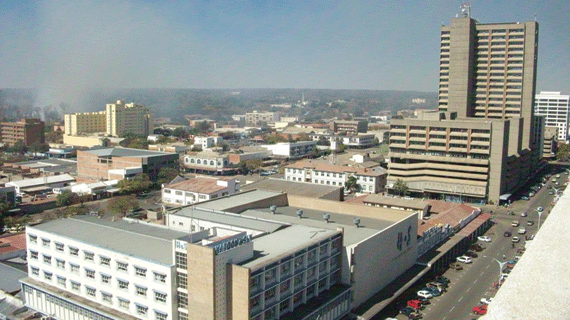
THE COLLAPSE of Zimbabwe’s industries in the past decade has brought misery to most families as many ordinary citizens have turned to vending, cross-border trading and prostitution to earn a living.
OWN CORRESPONDENT
Close to 100 companies have shut down in Bulawayo alone throwing over 20 000 workers onto the streets, according to a report by labour federation, the Zimbabwe Congress of Trade Unions (ZCTU) and a non-governmental organisation, Zimbabwe Coalition on Debt and Development titled “De-industrialisation in Zimbabwe”.
In 2004, over 200 companies employing 50 000 were operating in Bulawayo.
A 39-year-old mother of three and widow, Nothando Ndlovu, is a victim of the collapse of industries and was forced into commercial sex work for survival.
“I went into commercial sex after Cotton Printers shut down five years ago. I lost my job and was left with no source of income.
“My husband, who was a bus conductor with a local bus company, died in a road accident in 2007 and two years down the line our company shut down,” Ndlovu who resides in the high-density suburb of Pelandaba said.
“I worked as a house maid for six months, but the $50 monthly salary was not enough for my rent and to send my kids to school.” Ndlovu frequents bars and nightclubs in the city centre every evening looking for customers whom she charges $8 for a “short time” and $15 for all-night service.
- Chamisa under fire over US$120K donation
- Mavhunga puts DeMbare into Chibuku quarterfinals
- Pension funds bet on Cabora Bassa oilfields
- Councils defy govt fire tender directive
Keep Reading
“It’s not an easy job, especially these days of HIV and Aids. I insist on condoms to avoid infection, but sometimes I meet men who refuse to use protection. You have some who refuse to pay for services and beat you for demanding money. Police harass us for loitering at night and we pay fines. Some days you are robbed of all your earnings and go home empty handed,” she said.
Vegetable vendor Sylvester Moyo (42), a father of five, is another victim of factory closures and is now living a miserable life.
“Our company, Merlin Clothing shut down in 2011 and I lost my job,” Moyo said.
“I used to rent a three-roomed house in Nguboyenja suburb where I was staying with my family, but after losing my job, I sent them to our rural home in Tsholotsho because life had become very difficult.
“I could not put enough food on the table and at the same time pay rentals. I tried to look for another job, but to no avail,” he said.
He sold his old wardrobe and started vegetable vending in 2012 and sends $25 to his family every month from the proceeds. Moyo had to move to Makokoba where he shares a tiny room with a former workmate. He wakes up at 4am daily for the Bulawayo vegetable market in the city centre where he buys bundles of fresh vegetables and tomatoes for resale at an illegal vending bay along Joshua Mqabuko Nkomo Street.
“On a good day I make $4, but I am always engaged in running battles with municipal police because I am operating from an illegal vending bay and my goods are confiscated regularly. I cannot afford the $50 monthly vending licence fee,” Moyo said.
“Some days, business is low and we have to throw away our stock of perishable vegetables and tomatoes.”
Bulawayo City Council’s Ward 1 councillor Mulandu Ncube whose ward covers the city centre where most vendors operate from said: “We have people selling things at every corner of the street. We encourage them to apply for vending licences and conduct their business from designated places.
“This would help avoid continuous harassment by municipal police.”
Deborah Mukasa, secretary-general of the Zimbabwe Chamber of Informal Economy Association, which represents 15 000 informal traders countrywide said: “People are flooding the streets of cities and towns countrywide selling anything from tomatoes to second-hand clothes because of the company closures.
“Seven years ago we had 100 registered members in Bulawayo, but now we have over 3000 members. We call for meetings regularly with our members and engage experts who advise them on how to grow their businesses.”
The government is aware that Bulawayo is becoming a ghost town, but efforts to revive industry have so far been unsuccessful. Former Finance minister Tendai Biti launched the Distressed Industries Marginalised Areas Fund (Dimaf) in October 2012 following a directive by the coalition government to revive the country’s industries.
But disbursement of loans is very slow. Treasury has only released $13 million from the initial allocation of $60 million.
Lucky Mlilo, chief executive officer of the Association of Business in Zimbabwe (Abuz), a business representatives’ organisation said: “Even if Dimaf funds are released, they won’t make any impact. Our economy is on its knees and needs over $1 billion for revival. The only option is for the government to engage the World Bank and International Monetary Fund so that they can inject capital into our ailing industries.”
Industry and Commerce minister Mike Bimha, however, believes that ZimAsset is the solution.
“Under the ZimAsset programme, the government is looking at a possibility of reviving the country’s collapsed industries and wants to make Bulawayo a special economic zone,” he said. An economic zone status is given to an area which has potential to attract investment and is therefore given special incentives like assurance of utilities, low interest rates, tax reliefs and export incentives. Under ZimAsset, the government says it would pursue investment vehicles such as public private partnerships, particularly in the proposed special economic zones.
The ZimAsset blueprint says this arrangement would be implemented immediately to yield rapid results labelled quick wins in the shortest possible time frame (October 2013-December 2015) with other deliveries targeted up to December 2018.










